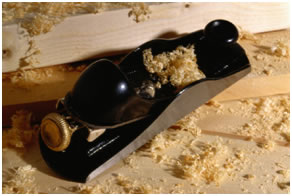
Figure 1- Woodworking
Can you turn this love of woodworking from a hobby into a business?
The answer can be found in the answers to these five questions:
- Are you a perfectionist? Do you spend countless hours getting each piece of wood to do exactly as you want? Being a woodworking perfectionist is fine when it’s a hobby, but it may mean that you will invest far too many hours in a specific project to make it a profitable business. One has to create a balance between quality and price.
- Does the thought of being an entrepreneur make you cringe? A woodworking business is more than just making pieces of handcrafted furniture and accessories. It requires recordkeeping. It means keeping track of your revenue and expenses. Always remember that it was the taxman that put Al Capone behind bars!
- Do you have the woodworking tools to commercialize your hobby? There is a vast difference between woodworking tools made for the home woodworker and those that are made to be operated eight hours a day, 5 days a week! Will you require an investment in new woodworking machinery?
- Are you prepared to work even if you really aren’t in the mood? The wife might be upset if you don’t finish the bookcase; but you can deal with that. If you are taking orders for custom woodworking projects for customers you will have deadlines that have to be met, whether you are in the mood or not!
- Are you a salesman? You will most likely get work from friends and relatives, but that is usually not enough to sustain a business. So, besides woodworking you will have to sell your products and services.
There are basically two types of woodworking businesses.
- You can take orders for custom woodworking, where you build to a customer’s specifications.
- You can make items and then sell them. There are hundreds of free woodworking plans available on the Internet. If you are making items to sell, you can avoid most of the problems associated with deadlines.
- You can take finished items to flea markets to sell directly or as samples to take orders. You can photograph samples of your work and for a small amount place them on eBay for sale or actually set-up a virtual store on the Internet. You can build the items when you get actual orders.
- Besides flea markets there are county fairs. You can also approach local garden centers for outdoor items such as benches, planters, landscape bridges and gazebos.
- You can approach local furniture retailers with items such as coat racks and hall trees and in the same manner local pet stores may be interested in dog houses, dog ramps or cat trees and houses.
- Consider offering a few of your products to a local charity auction. It is excellent advertising and your true out-of-pocket cost is minimal.
